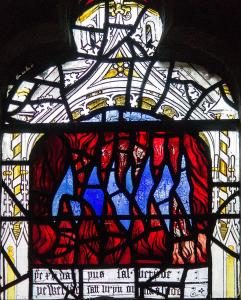
We have been given a conscience as a way for us to know what we should and should not do, especially when we find ourselves dealing with difficult moral choices. Its directives are to be followed, and insofar as we follow it, we can be seen as aiming for what is good, while those times we do not listen to it, but try to find excuses to justify resistance to it, our actions are ill-founded because we are going astray. “In all his activity a man is bound to follow his conscience in order that he may come to God, the end and purpose of life.”[1] This is not to say our conscience cannot be wrong, that it cannot suggest us to do something which would objectively be said to be evil, for it can, but that is because it directs us based upon what we know and understand, and if what we know is false, or deficient, then its directives can likewise be deficient. The conscience directs us to the good, but its ability to lead us to the good is imperfect; it is, nonetheless, of such value that its directives should be followed, and if we do not do so, we find ourselves to be standing against the good and, as such, stand guilty of moral failure. That is, if we reject what our conscience suggests and act contrary to it, we stand against the good which we know and understand, and so against the good; if, on the other hand, we follow its directives, we engage the good as we know it, and through it, find ourselves gaining greater insights in the good, allowing our conscience to grow and become better formed so that it will be less and less mistaken. It can be said, in this way, to be a pointer, showing the direction towards which we must go to follow after the good, and the further we follow it, the better, clearer its directions will be.
While we might have a general notion of what the conscience is, it is important to find a way to describe it, to understand fully what it is we are talking about, and so, it should be asked, what exactly do we mean by the conscience? St. Alphonsus Liguori, following Aquinas, gave us a nice, solid answer which we can use:
Conscience is so defined: “It is a judgment, or practical command of reason, in which we judge something must be done here and now as a good, or something must be avoided as an evil.” Moreover, conscience is called a practical command, in distinction from synderesis, which is the speculative knowledge of universal principles to live well, certainly: “That God must be worshiped, you do not do to another what you do not wish for yourself, etc.”, as St. Thomas holds, p.1, qu. 79, art. 12.[2]
Therefore, our conscience directs us, in part, through its use of reason, which explains why it is important for us to give it the right data, the right information, for reason is useless if it does not have something to use, some information which is known to be true, to make its determinations. Thus, the conscience takes all that has been given to it, and then engages it with the light of reason, determining., from it, to the best of its ability, what we should or should not do. This is why, if we are ignorant of something significant, it can make a wrong conclusion, and yet, we must follow its guidance because we know nothing better. We will not be held culpable if it leads us astray so long as our ignorance is not culpable ignorance. If, on the other hand, we purposefully keep ourselves ignorant so as to give ourselves the flexibility to do whatever we should want to do, then, we can be seen as working against our conscience, which would direct us to attain as must knowledge as we can, which is why we will be held accountable for what we do. For, as Augustine suggested, there is a difference between not knowing something we could and should know, and something which we can’t know. What is beyond us can’t be held against us, while avoiding what we could and should know is indicative of an evil will: “By not ignoring our own ignorance we shall be more secure against those who imagine they know what they do not know. There is a difference between what it is evil not to know and what cannot be known, or what it is not necessary to know, or what has no bearing on the way of life we seek.” [3]
This explains why invincible ignorance, so long as we follow our conscience, serves as justification for us if we do something which can be said to be objectively evil. Indeed, it would be an act of a tyrant, not a loving God, to punish us for such ignorance:
For that reason, no one is bound by some precept except by the medium of knowledge of that precept. And therefore, he does not have the capacity to notice the precept is not bound; nor is someone ignorant of the precept of God bound to carry out that precept, except insofar as he is held to know the precept. But if he were not held to know, nor knew, in no mode would he be bound by the precept. [4]
And, as God is love, God wants us to embrace the good as we know it. For when we do so, we will see the lesser good will point to the greater good, and the greater good, to an even greater good, until at last, we will find ourselves embracing the source and foundation of every good, God. The more we follow our conscience, going the direction which it points us to go, the more we will find ourselves habitually engaging the good, and through it, we will come to know more and more of the good, allowing us then to have a better formed conscience. Thus, it is important that we act if we want to become virtuous:
For in the study of virtue lies the root of good action; and the action, if it continues, is the more easily supported by habit and more readily attracts other such actions as help-mates, and becomes productive of the like when it is regulated by speech – since speech is wont, like a skilled husbandman, to show and help increase the virtues in one and the same sacred plot of the soul, not letting them be torn apart from each other and scattered.[5]
Many who do not have or accept revelation can still find themselves justified. For not only are they not to be judged for their ignorance, if they truly are invincibly ignorant, but they still have a moral guide within them, a guide which, if they follow, will direct them to the same good which revelation reveals. Certainly, if they follow their conscience, and if they are given proper introduction to revelation (which is not always as simple as it sounds), they will accept such revelation, and use it to reinforce their own moral development; on the other hand, if there is something which gets in the way of their knowing or accepting revelation through invincible ignorance, they are not going to be held to what was impossible for them to know and understand. And yet, at the end of their temporal life, they will be shown that what they followed was the same truth, the same goodness, given in revelation, although in a different form than the way it is found in revelation. Is this not one of the points Jesus suggested in his parable concerning the last judgment (cf. Matt. 25)? This should not be surprising, as God is love, and as God is love, God does not want to put any barrier up which would make it hard, if not impossible, for anyone to be saved. Indeed, as God is love, embracing the good of love, which we will do if we properly follow our conscience, will serve as the foundation by which we develop our virtues, and through them, find ourselves welcomed into the kingdom of God:
Surely, love is the beginning and the end of every virtue. May it comes to pass that we enjoy a true and constant love for others and that we come to the kingdom of heaven through the grace and loving-kindness of our Lord Jesus Christ, to whom be glory and power forever and ever.[6]
How much we embrace our conscience, indeed, how much we let it be developed, is something which is difficult for us, or for others, to truly ascertain. We can lie to ourselves, even as we can misrepresent ourselves to others, pretending to be something which we are not. This is why it is difficult to determine, even when dealing with grave objective evils, how culpable we are for what we do, and what kind of sin we commit when we disregard our conscience. Indeed, St. Alphonsius Liguori warned that not even confessors should be quick to make such determinations:
Still, it is very dangerous for confessors to condemn something as a grave sin, where certitude is not manifest, as St. Thomas teachings. “Every question in which it is sought on mortal sin, unless the truth were expressly held, a determination is dangerous” (Quodlib. 9, art.15). He adduces the reasoning of this doctrine a little later, namely, that “an error, in which something is believed to be mortal that is not, binds to mortal sin by conscience.” [7]
If those who are given some level of authority, and so responsibility, to judge, for the sake of pastoral guidance, are to be cautious when giving their judgment, those of us without such authority should be even more cautious when talking about the sins of others. We can, through what we know, discuss the situation objectively and try to discern the objective gravity of the sins involved (although, that is often easier said than done, which is why, even when trying to do that, we should be cautious). What we cannot know about the person is their subjective culpability because we do not know what their conscience is telling them to do, nor whether or not they have let their conscience be properly formed. Similarly, we might not know various contextual factors which would also limit their culpability, such as whether or not they were properly free to make a decision, a freedom which is necessary for someone to be fully culpable for what they do.
What is important for us to do is to develop ourselves, to follow with what we know and understand, and in doing so, help our conscience to become more and more developed in the process. “Therefore, it must be said that we must follow and embrace the truth which is shown to us by reason, and is posited beyond the eyes. “[8] This is what we are expected to do. The more we do so, the more we will find ourselves moving closer and closer to the source and foundation of every good, God, until at last, we truly have united ourselves with it.
Thus, the more we follow our conscience, the more it will develop, helping us to make better and better moral decisions. The more it develops, the more virtuous, indeed, more loving, we shall become, and through that love, we will find ourselves becoming more and more enlightened by God “In proportion to a man’s goodness, he is enlightened concerning God; and in proportion as he is drawn up in the knowledge of Him, he approaches freedom of soul.”[9] When we have truly been enlightened, and made free in that enlightenment, we will find ourselves conformed with, and so united with, the good, that is God, and in that unity, we will always have a proper understanding of what we should do in each particular circumstance we find ourselves in, even as, through the grace given to us in that union, we shall have the freedom we need to do what is best. Then, with such knowledge and ability, our actions will be able to unite objectivity with subjectivity, and what we do, will be objectively and subjectively good.
[1] Dignitatis humanae. Vatican translation. ¶3.
[2] St. Alphonsus Liguori, Moral Theology. Volume I: Books I – III On Conscience, Law, Sin and Virtue. Trans. Ryan Grant (Post Falls, ID: Mediatrix Press, 2017), 25.
[3] St. Augustine, “Letter 167 to Jerome” in Letters 165 – 203. Trans. Wilfrid Parsons, SND (New York: Fathers of the Church, 1955), 33 -4.
[4] St. Alphonsus Liguori, Moral Theology. Volume I: Books I – III On Conscience, Law, Sin and Virtue, 113.
[5] St. Photius, The Homilies of Photius, Patriarch of Constantinople. Trans. Cyril Mango (Harvard: Harvard University Press, 1958; repr. Eugene, OR: Wipf & Stock, 2017), 55 [Homily 2].
[6] St. John Chrysostom, On the Incomprehensible Nature of God. Trans. Paul W. Harkins (Washington, DC: CUA Press, 1982), 269 [Homily 10].
[7] St. Alphonsus Liguori, Moral Theology. Volume I: Books I – III On Conscience, Law, Sin and Virtue, 451.
[8] St. Alphonsus Liguori, Moral Theology. Volume I: Books I – III On Conscience, Law, Sin and Virtue, 295.
[9] Saint Isaac the Syrian, The Ascetical Homilies of Saint Isaac the Syrian. Trans. Monks of the Holy Transfiguration Monastery. Rev. 2nd ed (Boston, MA: Holy Transfiguration Monastery, 2011), 364 [Homily 48].
Stay in touch! Like A Little Bit of Nothing on Facebook.
If you liked what you read, please consider sharing it with your friends and family!












